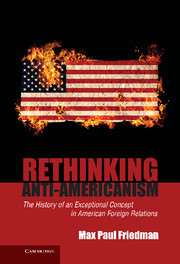5 - Myth and Consequences
De Gaulle, Anti-Americanism, and Vietnam
Published online by Cambridge University Press: 05 November 2012
Summary
A ‘mortal enemy,’ a ‘renegade friend,’ a ‘cynic,’ a ‘demagogue,’ a ‘homicidal lunatic’ inspired by ‘implacable hostility toward the United States’ and ‘the most ungrateful man since Judas Iscariot…’
– Members of Congress on Charles de GaulleWe have fought together, suffered together, triumphed together. It is hand in hand that our two countries must walk towards the future.
Long live the American Army! Long live the United States of America!
– Charles de Gaulle to General Dwight D. Eisenhower, 1945The Vietnam War brought a twin culmination to the history of anti-Americanism: a cresting of worldwide protest against the United States, and such widespread employment of the term anti-Americanism to explain foreign behavior as to harden it into an accepted truth. By 1968, foreign opinion of the United States had sunk to the lowest level ever measured, and charges of anti-Americanism were hurled in all directions. What has not been shown until now is that the very war that wrought this state of affairs was itself partly the product of the confused notion of anti-Americanism. Vietnam was a devastating illustration of what could happen when the U.S. political class and the public in general so fully absorbed the myth of anti-Americanism into their thinking that they became incapable of considering advice and criticism that might have spared their country from marching off that particular cliff. In a self-fulfilling prophesy, or a feedback loop, the conviction that anti-Americanism explained opposition to the United States abroad prevented Americans from taking seriously proposals and warnings that might have saved them from policies that increased foreign opposition abroad, which they read as more anti-Americanism. Prisoners of a discursive system that reduced complexities and choices to the misleading rubrics of pro- and anti-Americanism, they failed to see that there were paths available that would not lead into deadly quagmire.
- Type
- Chapter
- Information
- Rethinking Anti-AmericanismThe History of an Exceptional Concept in American Foreign Relations, pp. 157 - 189Publisher: Cambridge University PressPrint publication year: 2012



